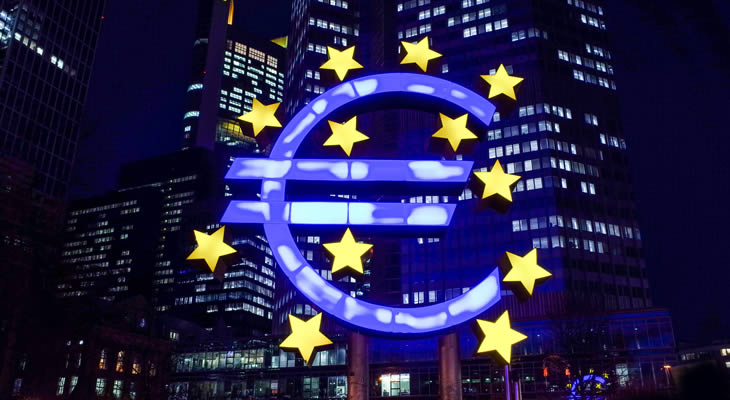Euro to Pound Sterling (EUR/GBP) Exchange Rate down over 0.5%
The Euro to Pound Sterling (EUR/GBP) exchange rate continued trending on the back foot on Monday as the Greek debt situation kept pressure on the common currency.
The Pound was able to outperform its European rival even as the Confederation of British Industry’s Reported Sales gauge failed to print at 35, as expected, and instead slid to 1 in February from 39 the previous month.
If tomorrow’s German reports (which include the nation’s final growth/inflation figures) are negatively revised, the EUR/GBP pairing could fall further still.
Before the close of the European session the Euro to Pound Sterling (EUR/GBP) exchange rate was trading in the region of 0.7338
Earlier…
EUR/GBP Exchange Rate Trending at 0.7367
Although the Euro to Pound Sterling (EUR/GBP) exchange rate initially advanced after it was announced that Greece had been granted a four-month extension to its current bailout programme, the temporary nature of the deal (coupled with concerns regarding how the Greek populace will react to a continuation of austerity measures) saw the Euro soften at the start of the week.
Demand for the common currency also slipped as the German IFO Business Climate, Current Assessment and Expectations reports came in below forecast.
Later today further EUR/GBP movement could be caused by the UK’s CBI reported sales figure and a speech to be given by the Bank of England’s Kristin Forbes.
As it stands, the Euro to Pound Sterling (EUR/GBP) exchange rate is trading in the region of 0.7368
Earlier…
EUR/GBP Exchange Rate Gains as Greece Reaches Draft Agreement with Creditors
The Euro to Pound Sterling (EUR/GBP) exchange rate spent much of the week trading close to a seven-year low as ‘Grexit’ fears and upbeat UK jobs figures drove Sterling higher.
However, the EUR/GBP currency pair experienced a reversal of fortunes on Friday as the UK published disappointing retail sales/public finance figures and Greece reached a tentative agreement with its creditors regarding an extension of its bailout programme.
Following an emergency meeting of Eurogroup officials, it was announced that Eurozone finance ministers have formed a draft agreement with Greece. However, it was also stressed that the accord isn’t formal yet.
According to a Greek government official; ‘There is an initial agreement on a joint draft text among the institutional partners, which is now being presented to all of the ministers. Details may be defined later. But let’s see.’
Greek Finance Minister Yanis Varoufakis commented; ‘The four-month period will be a time to rebuild new relations with Europe and the IMF.’
The development saw the Euro to Pound Sterling exchange rate fall from a high of 1.3625 to a low of 1.3511.
Euro to Pound Sterling (EUR/GBP) Exchange Rate Forecast – German Employment Data Ahead
The Euro to Pound Sterling (EUR/GBP) exchange rate could experience volatility in the week ahead as the Eurozone and its largest economy publish a number of influential economic reports.
Monday sees the release of Germany’s IFO Business Climate, Current Assessment and Expectations gauges.
The first sentiment measure is believed to have increased from 106.7 to 107.2, the second has been forecast to rally from 11.7 to 112.7 and the third is projected to rise from 102 to 103.3.
If confidence climbed in spite of the recent uncertainty in Greece, the Euro could advance at the beginning of the week.
On Tuesday Germany will be in focus again as the Eurozone’s largest economy releases German Government Spending and final fourth quarter growth data. The Eurozone is also set to publish its final Consumer Price Index for January. A negative revision to inflation would be Euro-negative.
Wednesday’s German Producer Price Index is unlikely to have much of an impact on EUR/GBP trading, but Thursday’s German GfK Consumer Confidence Survey and German employment figures are likely to spark movement.
Economists have forecast that the German unemployment rate held at 6.5% as the nation lost 10,000 positions in February.
The Eurozone’s industrial/consumer/economic/services confidence figures will also be of interest.
Recent ZEW indexes have shown improved sentiment, so these gauges may also climb.
Before the weekend a final flurry of Euro to Pound Sterling (EUR/GBP) exchange rate movement could be caused by Germany’s Consumer Price Index for February. If consumer prices fail to show the projected month-on-month increase, Sterling may gain on its European cousin.
At the close of the week the Pound Sterling to Euro (GBP/EUR) exchange rate was trading in the region of 1.3514
The Euro to US Dollar (EUR/USD) exchange rate was trading in the region of 1.1383
The US Dollar to Euro (USD/EUR) exchange rate was trading in the region of 0.8806
The Euro to Pound Sterling (EUR/GBP) exchange rate was trending in the region of 0.7407

